

Ingmar Bergman. Early life[edit] "I devoted my interest to the church's mysterious world of low arches, thick walls, the smell of eternity, the coloured sunlight quivering above the strangest vegetation of medieval paintings and carved figures on ceilings and walls.
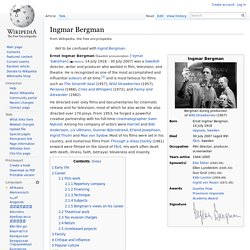
There was everything that one's imagination could desire — angels, saints, dragons, prophets, devils, humans". Although raised in a devout Lutheran household, Bergman later stated that he lost his faith at age eight and only came to terms with this fact while making Winter Light in 1962.[4] Bergman’s interest in theatre and film began early: "At the age of nine, he traded a set of tin soldiers for a magic lantern, a possession that altered the course of his life.
Within a year, he had created, by playing with this toy, a private world in which he felt completely at home, he recalled. He fashioned his own scenery, marionettes, and lighting effects and gave puppet productions of Strindberg plays in which he spoke all the parts. Sawdust and Tinsel. Sawdust and Tinsel (Swedish: Gycklarnas afton) is a 1953 Swedish drama film directed by Ingmar Bergman.
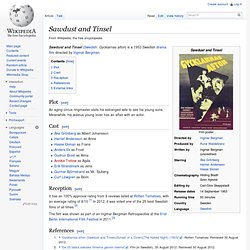
Plot[edit] An aging circus ringmaster visits his estranged wife to see his young sons. Meanwhile, his jealous young lover has an affair with an actor. Cast[edit] Reception[edit] It has an 100% approval rating from 9 reviews listed at Rotten Tomatoes, with an average rating of 8/10.[1] In 2012, it was voted one of the 25 best Swedish films of all times.[2]
The Seventh Seal. The film is considered a major classic of world cinema.
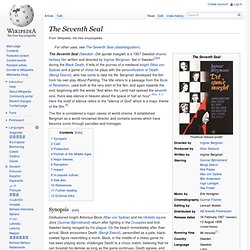
It established Bergman as a world-renowned director and contains scenes which have become iconic through parodies and homages. Synopsis[edit] Disillusioned knight Antonius Block (Max von Sydow) and his nihilistic squire Jöns (Gunnar Björnstrand) return after fighting in the Crusades and find Sweden being ravaged by the plague. On the beach immediately after their arrival, Block encounters Death (Bengt Ekerot), personified as a pale, black-cowled figure resembling a monk. Block, in the middle of a chess game he has been playing alone, challenges Death to a chess match, believing that he can forestall his demise as long as the game continues. The other characters in the story do not see Death, and when the chess board comes out at various times in the story, they believe Block is continuing his habit of playing alone.
Death and Antonius Block choose sides for the chess game; Death gets the black pieces. Raval reappears. Wild Strawberries (film) Wild Strawberries is a 1957 Swedish film written and directed by Ingmar Bergman about an old man recalling his past.
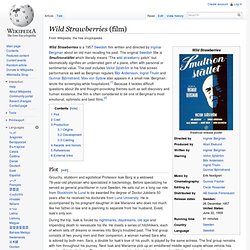
The original Swedish title is Smultronstället which literally means “The wild strawberry patch” but idiomatically signifies an underrated gem of a place, often with personal or sentimental value. The cast includes Victor Sjöström in his final screen performance as well as Bergman regulars Bibi Andersson, Ingrid Thulin and Gunnar Björnstrand. Max von Sydow also appears in a small role. Bergman wrote the screenplay while hospitalized.[1] Because it tackles difficult questions about life and thought-provoking themes such as self-discovery and human existence, the film is often considered to be one of Bergman's most emotional, optimistic and best films.[2] Grouchy, stubborn and egotistical Professor Isak Borg is a widowed 78-year-old physician who specialized in bacteriology.
Fanny and Alexander. Fanny and Alexander (Swedish: Fanny och Alexander) is a 1982 Swedish drama film written and directed by Ingmar Bergman.
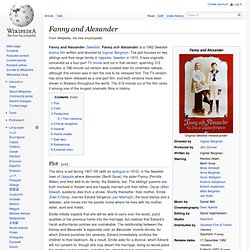
The plot focuses on two siblings and their large family in Uppsala, Sweden in 1910. It was originally conceived as a four-part TV movie and cut in that version, spanning 312 minutes; a 188-minute cut version was created later for cinematic release, although this version was in fact the one to be released first. The TV version has since been released as a one-part film, and both versions have been shown in theaters throughout the world.
The 312-minute cut of the film ranks it among one of the longest cinematic films in history. Persona (film) Persona is a 1966 Swedish film written and directed by Ingmar Bergman and starring Bibi Andersson and Liv Ullmann.
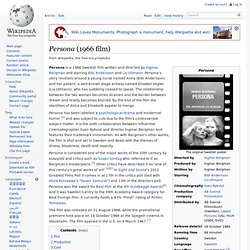
Persona’s story revolves around a young nurse named Alma (Bibi Andersson) and her patient, a well-known stage actress named Elisabet Vogler (Liv Ullmann), who has suddenly ceased to speak. The relationship between the two women becomes strained and the border between dream and reality becomes blurred. By the end of the film the identities of Alma and Elisabeth appear to merge.
Persona has been labelled a psychological drama and modernist horror [2] and was subject to cuts due to the film’s controversial subject matter. It is the sixth collaboration between influential cinematographer Sven Nykvist and director Ingmar Bergman and features their trademark minimalism. The film was released on 31 August 1966, while the promotional premiere took place on 18 October 1966 at the Spegeln cinema in Stockholm. Persona has lent itself to a variety of interpretations. Through a Glass Darkly (film) Through a Glass Darkly (Swedish: Såsom i en spegel) is a 1961 Swedish film written and directed by Ingmar Bergman, and produced by Allan Ekelund.
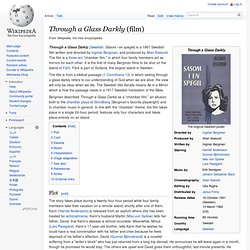
The film is a three-act "chamber film," in which four family members act as mirrors for each other. It is the first of many Bergman films to be shot on the island of Fårö. Fårö is part of Gotland, the largest island in Sweden. The title is from a biblical passage (1 Corinthians 13) in which seeing through a glass darkly refers to our understanding of God when we are alive; the view will only be clear when we die.